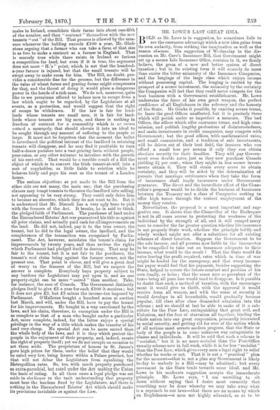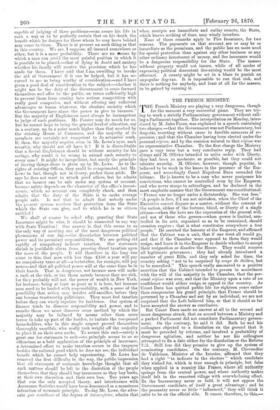MR. LOWE'S LAST GREAT IDEA.
BOLD as Mr. Lowe is in suggestion, he sometimes fails to see the enormous advantage which a new idea gains from its own audacity, from striking the imagination as well as the reason of omen. His suggestion of Wednesday in the dis- cussion on Mr. Cave's Insurance Bill, that Government might set up a secure Life Insurance Office, contains in it, we firmly believe, the germ of a new and better system of direct taxation ; but in its existing form it will scarcely do more than excite the bitter animosity of the Insurance Companies, and the longings of the large class which enjoys income without possessing capital. The longing is excited by the prospect of a secure investment, the animosity by the certainty the Companies will feel that they could never compete for the best business with a Government establishment. Mr. Lowe underrates the force of his own great weapon, the perfect confidence of all Englishmen in the solvency and the honesty of the State. He thinks it possible, by exacting severe terms, to leave the good Offices unaffected, but it is precisely these which will perish under so imperfect a measure. The bad Offices, the offices which offer enormous terms, and high com- mission, and publish lengthy professions of disinterestedness, and make investments in credit companies, may compete with Government ; but the good offices, with mathematical rates, and small commission, and a tradition of safe investments, will be driven out of their best field, the insurers who can afford a small loss per annum if only they can obtain absolute security for their families. They will pay Govern- ment even double rates, just as they now purchase Console yielding 31- per cent., when they might in less secure invest- ments obtain 6. They will strain every nerve to obtain certainty, and they will be aided by the determination of parents that marriage settlements when they take the form of insurances shall imply iusurances under Government guarantee. The direct and the immediate effect of the Chan- cellor's proposal would be to divide the business of Insurance between the Treasury and a class of Companies seeking to offer high terms through the rashest employment of the money they receive.
Nevertheless, the proposal is a most important and sug- gestive one. It shows that the Chancellor of the Exchequer is not in all cases averse to protecting the weakness of the individual by the strength of all, and it will compel many men to consider the far greater question whether life insurance is not properly State work, whether the principle boldly and wisely worked might not offer a substitute for all existing schemes of direct taxation. Suppose the Government to be the sole insurer, and all persons now liable to the income-tax to be compelled to take out an insurance adequate to their income, what would be the result ? That the State would fix rates leaving the profit required, rates which in time of war might be loaded for the emergency, and that every income- tax payer would feel that his payment, besides supporting the State, helped to secure the future comfort and position of his own family, or heirs ; that the sense now so prevalent of the taxes being all pure loss would tend to disappear. Is it possible to doubt that such a method of taxation, with the encourage- ment it would give to thrift, with the approval it would receive from all women, and with the sense of security it would develope in all households, would gradually become popular, till class after class demanded admission into the scheme ; and we should at last be able to make of it a sub- stitute for the Poor Law, extinguishing that great evil, and Unionism, and the fear of starvation all together, binding the whole nation into one great corporation, personally interested in social security, and getting rid for ever of the notion which of all notions most arrests modern progress, that the State or body of the people is in some unknown way antagonistic to classes and individuals. It will be said that such a scheme is "socialist," but it is no more socialist than the Post-Office annuity scheme now in full work, while it is far less "socialist" than the Poor Law, which gives every man a legal right to relief whether he works or not. That it is not a "practical" plan for the moment—that is, not a plan any Government is likely to-day to embody in a Bill—may be admitted ; but every movement in the State tends towards some ideal, and Mr. Lowe in his moderate suggestion accepts the immoderate principle. Mr. Lowe says, " I am unwilling to sit down without saying that I desire most earnestly that something may be done whereby we may take away what is a reproach to our laws—that there are no means by which an Englishman—a man not highly educated, so as to be capable of judging of these problems—can assure his life in such a way as to be perfectly certain that on his death the benefit which he designs fcr those whom he may leave behind may come to them. There is at present no such thing as that in this country. We are, I suppose, all insured somewhere or other, but it is a mere probability. There are no means by which a man can avoid the most painful position in which it is possible to be placed,—that of dying in doubt and anxiety whether his family will receive the provision which he has made for them. I have said that I am unwilling to invoke the aid of Government if it can be helped, but it has oc- curred to me as being worthy of consideration—and I have given a good deal of consideration to the subject—whether it might not be the duty of the Government to come forward themselves and offer to the public, on terms sufficiently high to prevent them from coming into serious competition with really good companies, and without offering any collateral advantages or bonus whatever, the absolute security which the Government have alone the power to give to insurers." But the majority of Englishmen must always be incompetent to judge of such problems. Mr. Forster may do much for us, but he cannot hope to bring the general level of education, say in a century, up to a point much higher than that reached by the existing House of Commons, and the majority of its members are certainly not competent to do actuaries' work. If, then, the majority require, even in Mr. Lowe's eyes, such security, why should not all have it ? If it is discreditable that a decent Englishman should be without security for his savings, why would it be wrong to extend such security to every man ? It might be inexpedient, but surely the principle of leaving things alone is given up by Mr. Lowe. As to the rights of existing Offices, they could be compensated, but Mr. Lowe in fact, though not in theory, pushes them aside. He says he does not want to attack good offices, but he admits that no insurer can he safe under any system of account, because safety depends on the character of the office's invest- ments, which no account can completely check, and then admits that the duty of the State is to make average people safe. Is not that to admit that nobody under the present system receives that protection from the State which the State can give, and to which he is as citizen entitled ?
We shall of course be asked why, granting that State Insurance might be wise, it should be connected in any way with State Taxation ? Our answer is, that this seems to us the only way of meeting one of the most dangerous political phenomena of our day,—the dissociation between political power and its pecuniary responsibilities. We are getting rid rapidly of compulsory indirect taxation. Our statesmen shrink in justifiable alarm from pressing direct taxation upon the mass of the people. It will therefore in the long run come to this, that men with less than £150 a year will pay no compulsory taxes at all—a teetotaller, for example, will pay none—and that all political power will at the same time be in their hands. That is dangerous, not because men will make a rush at the rich, or tax them merely because they are rich, for they probably will not, the power of wealth in New York, for instance, being at least as great as it is here, but because men need to be loaded with responsibility, with a sense of the possibility that action may involve self-sacrifice, before they can become trustworthy politicians. They must feel taxation before they can wisely regulate its incidence. Our system of finance tends to dissever responsibility and power, and to reunite them we must discover some method by which the majority may be induced by means other than mere terror to take up part of the burden, to imitate the ten-pound householders, who in this single respect proved themselves thoroughly unselfish, who really took weight off the majority to place it on their own necks. To secure this end—surely a great one for statesmen to seek—no principle seems to us so efficacious as a bold application of the principle of insurance, a determined effort to make taxation secure to the taxpayer besides the national good which he does not see, the individual benefit which he cannot help experiencing. Mr. Lowe has removed the first difficulty in the way, the public impression that all statesmen of economic knowledge thought that all ouch matters should be left to the discretion of the people themselves, that they should buy insurances as they buy boots, at their own discretion and their own loss. Ten years ago that was the only accepted theory, and interference with Assurance Societies would have been denounced as a monstrous infraction of economic principle. To-day Mr. Lowe, the advo- cate par excellence of the dogma of laissez-faire, admits that
when receipts are immediate and outlay remote, the State, which knows nothing of time, may wisely interfere.
None of these remarks apply to Fire Insurance, for two reasons. The payments on that account. are or may be as immediate as the premiums, and the public has no more need for special protection than against any other business or any other ordinary investment of money, and fire insurance would be a dangerous responsibility for the State. The masses without property would not insure, while of all modes of expressing political discontent fire-raising would be the most effectual. A county might be set in a blaze to punish an unpopular dog-tax. It is impossible to run that risk, and there is nothing for anybody, and least of all for the masses, to be gained by running it.



































 Previous page
Previous page